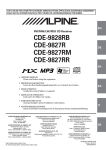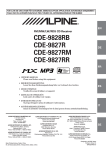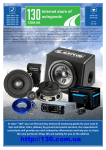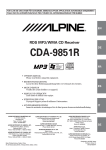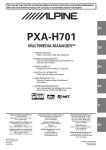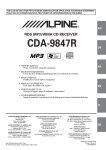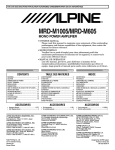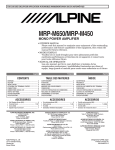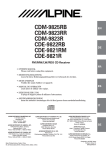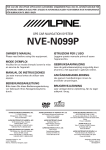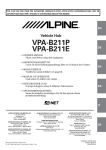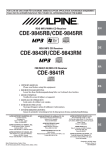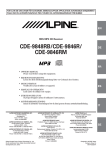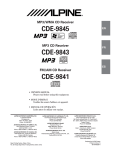Download Alpine CDE-9827RM Owner`s manual
Transcript
FOR CAR USE ONLY/NUR FÜR AUTOMOBIL GEBRAUCH/POUR APPLICATION AUTOMOBILE UNIQUEMENT/ PARA USO EN AUTOMÓVILES/SOLO PER L’UTILIZZO IN AUTOMOBILE/ENDAST FÖR BILBRUK R EN FM/MW/LW/RDS CD Receiver CDE-9828RB CDE-9827R CDE-9827RM CDE-9827RR DE FR • OWNER'S MANUAL Please read before using this equipment. • BEDIENUNGSANLEITUNG Lesen Sie diese Bedienungsanleitung bitte vor Gebrauch des Gerätes. ES • MODE D'EMPLOI Veuillez lire avant d’utiliser cet appareil. • MANUAL DE OPERACIÓN Léalo antes de utilizar este equipo. • ISTRUZIONI PER L’USO Si prega di leggere prima di utilizzare il attrezzatura. • ANVÄNDARHANDLEDNING Innan du använder utrustningen bör du läsa igenom denna användarhandledning. ALPINE ELECTRONICS MARKETING, INC. 1-1-8 Nishi Gotanda, Shinagawa-ku, Tokyo 141-0031, Japan Phone 03-5496-8231 ALPINE ELECTRONICS OF AUSTRALIA PTY. LTD. 6-8 Fiveways Boulevarde Keysborough, Victoria 3173, Australia Phone 03-9769-0000 ALPINE ELECTRONICS GmbH Frankfurter Ring 117, 80807 München, Germany Phone 089-32 42 640 ALPINE ELECTRONICS OF AMERICA, INC. 19145 Gramercy Place, Torrance, California 90501, U.S.A. Phone 1-800-ALPINE-1 (1-800-257-4631) ALPINE ELECTRONICS OF CANADA, INC. 7300 Warden Ave., Suite 203, Markham, Ontario L3R 9Z6, Canada Phone 1-800-ALPINE-1 (1-800-257-4631) ALPINE ELECTRONICS OF U.K. LTD. Alpine House Fletchamstead Highway, Coventry CV4 9TW, U.K. Phone 0870-33 33 763 Meiyi Printing Factory, Dalian, China No. 28 Chang Qing Street, Xi Gang District, Dalian, China ALPINE ELECTRONICS FRANCE S.A.R.L. (RCS PONTOISE B 338 101 280) 98, Rue de la Belle Etoile, Z.I. Paris Nord Il, B.P. 50016, 95945 Roissy Charles de Gaulle Cedex, France Phone 01-48638989 ALPINE ITALIA S.p.A. Viale C. Colombo 8, 20090 Trezzano Sul Naviglio (MI), Italy Phone 02-484781 ALPINE ELECTRONICS DE ESPAÑA, S.A. Portal de Gamarra 36, Pabellón, 32 01013 Vitoria (Alava)-APDO 133, Spain Phone 945-283588 Designed by ALPINE Japan Printed in China (Y) 68P02294K95-O IT SE ENGLISH Contents Operating Instructions WARNING WARNING .................................................. 2 CAUTION ................................................... 2 PRECAUTIONS ......................................... 2 Getting Started Turning Power On and Off ............................... 5 Detaching and Attaching the Front Panel ......... 5 Initial System Start-Up ..................................... 5 Adjusting Volume ............................................. 5 Radio Listening to Radio ............................................. 6 Manual Storing of Station Presets .................... 6 Automatic Memory of Station Presets .............. 6 Tuning to Preset Stations .................................. 6 RDS Setting RDS Reception Mode and Receiving RDS Stations ................................................. 7 Recalling Preset RDS Stations .......................... 7 Receiving RDS Regional (Local) Stations ....... 7 PI SEEK Setting ................................................ 8 Receiving Traffic Information .......................... 8 PTY (Programme Type) Tuning ....................... 8 Receiving Traffic Information While Playing CD or Radio ................................................... 9 Priority News .................................................... 9 Displaying Radio Text ...................................... 9 CD/MP3/WMA Playback .......................................................... 10 Playing back a playlist .................................... 10 Repeat Play ..................................................... 11 M.I.X. (Random Play) .................................... 11 Scanning Programmes .................................... 11 Searching from CD Text ................................. 11 File/Folder Name Search (concerning MP3/WMA) .............................. 12 Quick Search ................................................... 12 About MP3/WMA .......................................... 12 Sound Setting Adjusting Balance (Between Left and Right)/ Fader (Between Front and Rear)/Defeat ...... 14 Setting the Bass Control ................................. 14 Setting the Treble Control ............................... 15 Setting the Bass Type ...................................... 15 Setting the MX Mode ..................................... 15 Other Functions Displaying the Title/Text ................................. 16 Titling Discs .................................................... 17 Erasing Disc Title ............................................ 17 SETUP Sound Customizing Adjusting Source Signal Levels ...................... 18 Switching the Tuner Mode .............................. 18 Subwoofer On and Off .................................... 18 Visual Customizing Scroll Setting ................................................... 18 MP3/WMA Playing MP3/WMA Data ................................ 19 External Device Connecting to an External Amplifier .............. 19 Information In Case of Difficulty ....................................... 19 Specifications .................................................. 21 Installation and Connections Warning ........................................................... 22 Caution ............................................................ 22 Precautions ...................................................... 22 Installation ...................................................... 23 Connections ...................................................... 24 Windows Media and the Windows logo are trademarks, or registered trademarks of Microsoft Corporation in the United States and /or other countries. 1-EN Operating Instructions WARNING WARNING This symbol means important instructions. Failure to heed them can result in serious injury or death. DO NOT OPERATE ANY FUNCTION THAT TAKES YOUR ATTENTION AWAY FROM SAFELY DRIVING YOUR VEHICLE. Any function that requires your prolonged attention should only be performed after coming to a complete stop. Always stop the vehicle in a safe location before performing these functions. Failure to do so may result in an accident. CAUTION This symbol means important instructions. Failure to heed them can result in injury or material property damage. HALT USE IMMEDIATELY IF A PROBLEM APPEARS. Failure to do so may cause personal injury or damage to the product. Return it to your authorized Alpine dealer or the nearest Alpine Service Centre for repairing. PRECAUTIONS Product Cleaning KEEP THE VOLUME AT A LEVEL WHERE YOU CAN STILL HEAR OUTSIDE NOISE WHILE DRIVING. Failure to do so may result in an accident. Use a soft dry cloth for periodic cleaning of the product. For more severe stains, please dampen the cloth with water only. Anything else has the chance of dissolving the paint or damaging the plastic. DO NOT DISASSEMBLE OR ALTER. Doing so may result in an accident, fire or electric shock. Temperature USE ONLY IN CARS WITH A 12 VOLT NEGATIVE GROUND. Be sure the temperature inside the vehicle is between +60°C (+140°F) and –10°C (+14°F) before turning your unit on. (Check with your dealer if you are not sure.) Failure to do so may result in fire, etc. Moisture Condensation KEEP SMALL OBJECTS SUCH AS BATTERIES OUT OF THE REACH OF CHILDREN. You may notice the CD playback sound wavering due to condensation. If this happens, remove the disc from the player and wait about an hour for the moisture to evaporate. Swallowing them may result in serious injury. If swallowed, consult a physician immediately. Damaged Disc USE THE CORRECT AMPERE RATING WHEN REPLACING FUSES. Do not attempt to play cracked, warped, or damaged discs. Playing a bad disc could severely damage the playback mechanism. Failure to do so may result in fire or electric shock. Maintenance DO NOT BLOCK VENTS OR RADIATOR PANELS. If you have problems, do not attempt to repair the unit yourself. Return it to your Alpine dealer or the nearest Alpine Service Station for servicing. Doing so may cause heat to build up inside and may result in fire. USE THIS PRODUCT FOR MOBILE 12V APPLICATIONS. Use for other than its designed application may result in fire, electric shock or other injury. DO NOT PLACE HANDS, FINGERS OR FOREIGN OBJECTS IN INSERTION SLOTS OR GAPS. Doing so may result in personal injury or damage to the product. 2-EN Correct Handling PRECAUTIONS Do not drop the disc while handling. Hold the disc so you will not leave fingerprints on the surface. Do not affix tape, paper, or gummed labels to the disc. Do not write on the disc. Never Attempt the Following Do not grip or pull out the disc while it is being pulled back into the player by the automatic reloading mechanism. Do not attempt to insert a disc into the unit when the unit power is off. CORRECT INCORRECT Inserting Discs Your player accepts only one disc at a time for playback. Do not attempt to load more than one disc. Make sure the label side is facing up when you insert the disc. Your player will automatically eject any disc that is inserted incorrectly. If the player continues to eject a correctly inserted disc, push the RESET switch with a pointed object such as a ballpoint pen. Playing a disc while driving on a very bumpy road may result in skips, but this will not scratch the disc or damage the player. CORRECT Disc Cleaning Fingerprints, dust, or soil on the surface of the disc could cause the CD player to skip. For routine cleaning, wipe the playing surface with a clean, soft cloth from the centre of the disc to the outer edge. If the surface is heavily soiled, dampen a clean, soft cloth in a solution of mild neutral detergent before cleaning the disc. New Discs As a protective measure to prevent the CD from jamming, the CD player will automatically eject discs with irregular surfaces or inserted incorrectly. When a new disc is inserted into the player and ejected after initial loading, using your finger, feel around the inside of the centre hole and outside edge of the disc. If you feel any small bumps or irregularities, this could inhibit proper loading of the disc. To remove the bumps, rub the inside edge of the hole and outside edge of the disc with a ballpoint pen or other such instrument, then insert the disc again. Centre Hole Bumps Centre Hole Disc Accessories There are various accessories available on the market for protecting the disc surface and improving sound quality. However, most of them will influence the thickness and/or diameter of the disc. Using such accessories can cause the disc to be out of standard specifications and may create operational problems. We recommend not using these accessories on discs played in Alpine CD players. New Disc Outside (Bumps) Transparent Sheet Disc Stabilizer Irregular Shaped Discs Be sure to use round shape discs only for this unit and never use any special shape discs. Use of special shape discs may cause damage to the mechanism. Continued Installation Location Make sure the CDE-9828RB/CDE-9827R/CDE-9827RM/CDE9827RR will not be installed in a location subjected to: • • • • Direct sun and heat High humidity and water Excessive dust Excessive vibrations 3-EN On handling Compact Discs (CD/CD-R/CD-RW) • • • • • • Do not touch the surface. Do not expose the disc to direct sunlight. Do not affix stickers or labels. Clean the disc when it is dusty. Make sure that there are no bumps around the disc. Do not use commercially available disc accessories. Do not leave the disc in the car or the unit for a long time. Never expose the disc to direct sunlight. Heat and humidity may damage the CD and you may not be able to play it again. To customers using CD-R/CD-RW • • If a CD-R/CD-RW cannot be played back, make sure the last recording session was closed (finalized). Finalize the CD-R/CD-RW if necessary, and attempt playback again. About media that can be played. Use only compact discs with the label side showing the CD logo marks below. If you use unspecified compact discs, correct performance cannot be guaranteed. You can play CD-Rs (CD-Recordable)/CD-RWs (CDReWritable) which have been recorded only on audio devices. You can also play CD-Rs/CD-RWs containing MP3/WMA formatted audio files. • • Some of the following CDs may not play on this unit: Flawed CDs, CDs with fingerprints, CDs exposed to extreme temperatures or sunlight (e.g., left in the car or this unit), CDs recorded under unstable conditions, CDs on which a recording failed or a re-recording was attempted, copyprotected CDs which do not conform to the audio CD industry standard. Use discs with MP3/WMA files written in a format compatible with this unit. For details, see pages 12-13. 4-EN Getting Started Initial System Start-Up Be sure to press the RESET switch when using the unit for the first time, after changing the car battery, etc. SOURCE/ POWER Rotary encoder 1 2 3 Turn off the unit power. Remove the detachable front panel. Press RESET with a ballpoint pen or similar pointed object. 1 RESET switch Turning Power On and Off Adjusting Volume Press SOURCE/POWER to turn on the unit. • The unit can be turned on by pressing any other button except eject c. Press and hold SOURCE/POWER for at least 2 seconds to turn off the unit. • The first time power is turned on, the volume will start from level 12. Turn the Rotary encoder until the desired sound is obtained. Connectable to Remote Control Interface Box You can operate this unit from the vehicle's control unit when an Alpine Remote Control Interface Box (optional) is connected. For details, contact your Alpine dealer. Detaching and Attaching the Front Panel Detaching 1 2 3 Turn off the unit power. Press (Release) at the upper left side until the front panel pops out. Grasp the left side of the front panel and pull it out. • The front panel may become hot in normal usage (especially the connector terminals on the back of the front panel.) This is not a malfunction. • To protect the front panel, place it in the supplied carrying case. Attaching 1 2 Insert the right side of the front panel into the main unit. Align the groove on the front panel with the projections on the main unit. Push the left side of the front panel until it locks firmly into the main unit. 2 1 • Before attaching the front panel, make sure that there is no dirt or dust on the connector terminals and no foreign object between the front panel and the main unit. • Attach the front panel carefully, holding the sides of the front panel to avoid pushing buttons by mistake.. 5-EN Radio Automatic Memory of Station Presets 1 SOURCE/ TUNE/ POWER A.ME BAND Rotary encoder SEARCH/Q.S. g f F/SETUP Preset buttons (1 through 6) 2 Press BAND repeatedly until the desired radio band is displayed. Press and hold TUNE/A.ME for at least 2 seconds. The frequency on the display continues to change while the automatic memory is in progress. The tuner will automatically seek and store 6 strong stations in the selected band. They will be stored into buttons 1 to 6 in order of signal strength. When the automatic memory has been completed, the tuner goes to the station stored in preset location no. 1. • If no stations are stored, the tuner will return to the original station you were listening to before the auto memory procedure began. Tuning to Preset Stations Listening to Radio 1 2 3 Press SOURCE/POWER until a radio frequency appears in the display. Press any one of the station preset buttons (1 through 6) that has your desired radio station in memory. F1 (FM1) → F2 (FM2) → F3 (FM3) → M (MW) → L (LW) → F1 (FM1) The display shows the band, preset number and frequency of the station selected. Press TUNE/A.ME to select the tuning mode. • The initial mode is Distance mode. Distance mode: Both strong and weak stations will be automatically tuned in (Automatic Seek Tuning). Local mode: Only strong stations will be automatically tuned in (Automatic Seek Tuning). Manual mode: The frequency is manually tuned in steps (Manual tuning). Press g or f to tune in the desired station. Holding down g or f will change the frequency continuously. • The ST indicator appears on the display when a stereo FM station is tuned in. Manual Storing of Station Presets 1 2 2 Press BAND repeatedly until the desired band is displayed. Press BAND repeatedly until the desired radio band is displayed. DX SEEK (Distance mode) → SEEK (Local mode) → OFF (Manual mode) → DX SEEK 4 1 Select the radio band and tune in a desired radio station you wish to store in the preset memory. Press and hold, for at least 2 seconds, any one of the preset buttons (1 through 6) that you want to store the station on. The selected station is stored. The display shows the band, preset no. and station frequency memorized. • A total of 30 stations can be stored in the preset memory (6 stations for each band; FM1, FM2, FM3, MW and LW). • If you store a station in a preset memory which already has a station, the current station will be cleared and replaced with the new station. • If the “FUNC” indicator is illuminated, turn off the indicator by pressing F/SETUP, then you can perform the operation. 6-EN • If the “FUNC” indicator is illuminated, turn off the indicator by pressing F/SETUP, then you can perform the operation. RDS Recalling Preset RDS Stations 1 BAND 2 3 4 5 2 3 4 5 Press F/SETUP so that the “FUNC” indicator lights up. Press 1/AF to activate the RDS mode. Press g or f to tune in the desired RDS station. Make sure that the “FUNC” indicator light goes out, then press the preset button in which your desired RDS station is preset. If the preset station and the stations in the AF list cannot be received: • For presetting the RDS stations, refer to the Radio Operation section. The RDS stations can be preset in the F1, F2 and F3 bands only. Receiving RDS Regional (Local) Stations Press 1/AF again to deactivate the RDS mode. 1 Press F/SETUP to activate the normal mode. The “FUNC” indicator goes out. 2 The RDS digital data includes the following: PI Programme Identification PS Programme Service Name AF List of Alternative Frequencies TP Traffic Programme TA Traffic Announcement PTY Programme Type EON Enhanced Other Networks Press F/SETUP to activate the normal mode. The “FUNC” indicator goes out. When the PI SEEK setting is on (refer to “PI SEEK Setting” on page 8), the unit searches again for a station in the PI (Programme Identification) list. If there are still no stations receivable in the area, the unit displays the frequency of the preset station and the preset no. disappears. If the signal level of the Regional (Local) station being tuned becomes too weak to receive, press the same preset button to tune in a Regional station in other district. The RDS (Radio Data System) is a radio information system using the 57 kHz subcarrier of regular FM broadcast. The RDS allows you to receive a variety of information such as traffic information, station names, and to automatically re-tune to a stronger transmitter that is broadcasting the same programme. 1 Press 1/AF to activate the RDS mode. If the preset station's signal is weak, the unit automatically searches and tunes to a stronger station in the AF (Alternative Frequencies) list. g f T.INFO F/SETUP 1/AF 2/NEWS 3/PTY DISP/ TITLE Setting RDS Reception Mode and Receiving RDS Stations Press F/SETUP so that the “FUNC” indicator lights up. 3 Press and hold F/SETUP for at least 2 seconds to / activate the setting mode. Press g or f to select the REG (Regional) mode. Press BAND to turn on or off the REG (Regional) mode. In the REG OFF mode, the unit automatically keeps receiving the related local RDS station. 4 Press F/SETUP to deactivate the setting mode. 7-EN PI SEEK Setting PTY (Programme Type) Tuning 1 2 3 1 4 Press and hold F/SETUP for at least 2 seconds. Press g or f to select “PISK.” Press BAND to toggle the mode between “PISK ON” and “PISK OFF.” 2 Press F/SETUP to set the selected mode. 2 Press T.INFO so that the “T.INFO” indicator lights up. Press g or f to select your desired traffic information station. When a traffic information station is tuned in, the “TP” indicator lights up. Traffic information is heard only when it is being broadcast. If traffic information is not being broadcast, the unit is set in the standby mode. When a traffic information broadcast begins, the unit automatically receives it and the display shows “TRF-INFO” for a few seconds and returns to the PS display. When the traffic information broadcast is over, the unit will automatically set in the standby mode. • If the traffic information broadcast signal falls below a certain level, the unit remains in the receiving mode for 1 minute. If the signal remains below a certain level for over 1 minute, the “T.INFO” indicator blinks. • If you do not want to listen to the traffic information being received, lightly press T.INFO to skip that traffic information message. The T.INFO mode will remain in the ON position to receive the next traffic information message. • If the volume level is changed while receiving traffic information, the changed volume level will be memorized. When traffic information is received next time, the volume level will be automatically adjusted to the level memorized. • In the T.INFO mode, the SEEK tuning selects only the TP stations. 8-EN Press 3/PTY to activate the PTY mode, while the unit is in Radio (FM receiving) mode. The Programme Type of the station being currently received will be displayed for 5 seconds. If there is no receivable PTY broadcast, “NO PTY” will be displayed for 5 seconds. If no RDS station can be received, the display shows “NO PTY.” Receiving Traffic Information 1 Press F/SETUP so that the “FUNC” indicator lights up. • If no operation is performed within 5 seconds after pressing 3/PTY, the PTY mode will be automatically cancelled. 3 Press g and f within 5 seconds after activating the PTY mode to choose the desired programme type while the PTY (programme type) is being displayed. Each press scrolls the programme type by one. LIGHT M ↔ CLASSICS ↔ OTHER M 4 Press 3/PTY within 5 seconds after selecting the programme type to start searching for a station in the selected programme type. The chosen programme type display blinks during searching and lights when a station is found. If no PTY station is found, “NO PTY” will be displayed for 5 seconds. 5 Press F/SETUP to activate the normal mode. The “FUNC” indicator goes out. • Operate the unit while the “FUNC” indicator lights up. If no operation is performed within 5 seconds, the “FUNC” indicator goes out. Receiving Traffic Information While Playing CD or Radio 1 2 Press T.INFO so that the “T.INFO” indicator lights up. Press g and f to select a traffic information station if necessary. When a traffic information broadcast starts, the unit automatically mutes the CD player/changer or the regular FM broadcast. When the traffic information broadcast finishes, the unit automatically returns to the original source play before the traffic information broadcast began. Priority News This function allows you to preset to give priority to the News programme. You will never miss the News programme as the unit automatically gives priority to the News programme whenever it begins broadcasting, and interrupts the programme you are currently listening. This feature is functional when your unit is set to a mode other than the LW and MW modes. 1 2 Press F/SETUP so that the “FUNC” indicator lights up while the unit is in Radio (FM receiving) mode. Press 2/NEWS to activate the PRIORITY NEWS mode. The “NEWS” indicator appears in the display. To disable the PRIORITY NEWS function, press 2/NEWS. When traffic information stations cannot be received: In the tuner mode: When the TP signal can no longer be received for over 1 minute, the “T.INFO” indicator blinks. In the CD mode: When the TP signal can no longer be received, the traffic information station of another frequency will be selected automatically. • The receiver is equipped with the EON (Enhanced Other Networks) function in order to keep track of additional alternate frequencies to the AF list. The “EON” indicator lights up while an RDS EON station is being received. If the station being received does not broadcast the traffic information, the receiver automatically tunes in the related station that broadcasts the traffic information when it occurs. 3 Press T.INFO to deactivate the Traffic Information mode. The “T.INFO” indicator goes out. • In the PRIORITY NEWS function, unlike in the T.INFO function, the volume does not increase automatically. 3 Press F/SETUP to activate the normal mode, while the unit is in Radio (FM receiving) mode. The “FUNC” indicator light goes out. Displaying Radio Text Text messages from a radio station can be displayed. 1 Press DISP/TITLE while receiving FM in the radio mode to select the Radio Text display. The display will change every time the button is pressed. PS (Programme Service Name) → Radio Text → FREQUENCY → PS (Programme Service Name) The display shows “WAITING” for a few seconds, then starts scrolling the text message. • If there is no receivable text message or the unit cannot receive a text message properly, the display shows “NO TEXT.” 9-EN • “WMA” is displayed during WMA playback. • The track display for MP3/WMA data playback is the file numbers recorded on the disc. CD/MP3/WMA MP3/WMA Play Display Rotary encoder -/J c 8 SEARCH/Q.S. The folder number and file number will be displayed as described below. F01 T03 Folder number display g f 9 4( ) 5( ) 6( ) DISP TITLE Playback 1 Insert a disc with the label side facing up. The disc will be pulled into the unit automatically. File number display • Press DISP/TITLE to switch the display. Please see “Displaying the Title/Text” (page 16) for information about display switching. Playing back a Playlist You can play playlists you have prepared in advance on the computer. Both MP3 and WMA playlists can be played. Playlists that can be played back by this device have the file extension “m3u”/“asx.” Press 8 or 9 to select a playlist. By pressing and holding 8 or 9, the playlists move up or down continuously. When a disc is already inserted, press SOURCE/POWER to switch to the CD mode. The mode will change every time the button is pressed. TUNER → CD → TUNER 2 While playing back MP3/WMA, press 8 or 9 to select the desired folder. Pressing and holding 8 or 9 will change folders continuously. 3 • If there is a playlist and folder on the disc, the playlist starts to play back prior to the folder. • Up to 5 playlist can be played back. Playlists from the 6th onwards cannot be played back. • Refer to the software instruction manual on how to create a playlist. • Playlist playback applies only to the selected playlist. To play the next playlist or folder, perform the folder up/down operation. Playlist Display While playing back a playlist, the folder and file numbers that are stored in the playlist are displayed. Press g or f to select the desired track (file). Returning to the beginning of the current track (file): Press g. Fast backward : Press and hold g. Advancing to the beginning of the next track (file) : Press f. Fast forward : Press and hold f. 4 To pause playback, press -/J. 5 To eject the disc, press c. Pressing -/J again will resume playback. • Do not remove a CD during its eject cycle. Do not load more than one disc at a time. A malfunction may result from doing either. • If the CD does not eject, press and hold c for at least 2 seconds. • The CD-player can play discs containing audio data, MP3 data and WMA data. • A WMA format file that is protected by DRM (Digital Rights Management) cannot be played back on this unit. • “MP3” is displayed during MP3 playback. 10-EN P-L F03 T05 Repeat Play Scanning Programmes Press 4 ( played. Press 6 ( ) to play back repeatedly the track being The track (file) will be played repeatedly. Press 4 ( ) again and select OFF to deactivate repeat play. ) to activate the Scan mode. The first 10 seconds of each track (file) will be played back in succession. To stop scanning, press 6 ( mode. ) and deactivate the Scan CD mode : RPT : Only a track is repeatedly played back ↓ Tracks can be searched and played using the CD text on the disc. In the case of discs and changers that do not support text, searches can be made using the track numbers. (off) 1 MP3/WMA mode : RPT : Only a file is repeatedly played back ↓ RPT Searching from CD Text : Only files in a folder are repeatedly played back ↓ (off) 2 Press SEARCH/Q.S. during play. This will set the search mode. Turn the Rotary encoder to select the desired track, then press the Rotary encoder. This will play the selected track. • Press and hold SEARCH/Q.S. for at least 2 seconds in the search mode to cancel. Or, the search mode will be cancelled when an operation has not been performed in 10 seconds. • CD text search cannot be made during M.I.X. play. M.I.X. (Random Play) Press 5 ( ) in the play or pause mode. The tracks (files) on the disc will be played back in random sequence. To cancel M.I.X. play, press 5 ( ) again. CD mode : ↓ M.I.X. : Track are played back in random sequence. ↓ (off) MP3/WMA mode : ↓ M.I.X.: Only files in a folder are played back in random sequence. ↓ M.I.X.: Files are played back in random sequence. ↓ (off) • When playing back a playlist, M.I.X. cannot be played. 11-EN File/Folder Name Search (concerning MP3/WMA) You can display and search for the folder and file name while listening to the file currently being played back. 1 Press SEARCH/Q.S. to select File Name Search mode or Folder Name Search mode in MP3/WMA mode. File Name Search mode 2 3 4 Press 8 or 9 to select another Folder. Select the desired file by turning the Rotary encoder within 10 seconds. Press the Rotary encoder to play back the selected file. • File Name Search mode is cancelled by pressing and holding SEARCH/Q.S. for at least 2 seconds. • While in File Name Search mode, press SEARCH/Q.S. to switch to Folder Name Search mode. • File Name search cannot be made during M.I.X. play. • File Name search cannot be made while playing back a playlist. Folder Name Search mode 2 3 Turn the Rotary encoder within 10 seconds to select the desired folder or playlist. Press the Rotary encoder to play back the first file in the selected folder or playlist. • Search mode is cancelled by pressing and holding SEARCH/Q.S. for at least 2 seconds in Folder Name Search mode. • While in Folder Name Search mode, press SEARCH/Q.S. to switch to File Name Search mode. • “NO FILE” is displayed for 2 seconds if the folder or playlist that is selected by the Folder Name Search mode contains no files. • “0 (zero)” is displayed for the root folder. • Folder Name search cannot be made during M.I.X. play. Quick Search You can search for tracks (files). 1 2 Press and hold SEARCH/Q.S. for at least 2 seconds in the CD/MP3/WMA mode to activate Quick Search mode. Turn the Rotary encoder within 10 seconds to select a desired track (file). The selected track is played back immediately. • Search mode is cancelled by pressing and holding SEARCH/Q.S. for at least 2 seconds in Quick Search mode. About MP3/WMA CAUTION Except for private use, duplicating audio data (including MP3/ WMA data) or distributing, transferring, or copying it, whether for free or for a fee, without permission of the copyright holder is strictly prohibited by the Copyright Act and by international treaty. What is MP3? MP3, whose official name is “MPEG-1 Audio Layer 3,” is a compression standard prescribed by the ISO, the International Standardization Organization and MPEG which is a joint activity institution of the IEC. MP3 files contain compressed audio data. MP3 encoding is capable of compressing audio data at extremely high ratios, reducing the size of music files to as much as one-tenth their original size. This is achieved while still maintaining near CD quality. The MP3 format realizes such high compression ratios by eliminating the sounds that are either inaudible to the human ear or masked by other sounds. What is WMA? WMA, or “Windows Media™ Audio,” is compressed audio data. WMA allows you to create music files and store them at higher ratios of compression than MP3 audio data (approx. half original size). This is achieved while still maintaining CD quality sound. Method for creating MP3/WMA files Audio data is compressed by using MP3/WMA specified software. For details on creating MP3/WMA files, refer to the user's manual for that software. MP3/WMA files that can be played back by this device have the file extension “mp3” / “wma”. Files with no extension cannot be played back. (WMA ver. 7.1 and 8 are supported) Supported playback sampling rates and bit rates MP3 Sampling rates: 48 kHz, 44.1 kHz, 32 kHz, 24 kHz, 22.05 kHz, 16 kHz, 12 kHz, 11.025 kHz, 8 kHz Bit rates: 8 - 320 kbps WMA Sampling rates: 48 kHz, 44.1 kHz, 32 kHz, 24 kHz, 22.05 kHz Bit rates: 48 - 192 kbps Note that for sampling rates, this device’s frame display (Page 16) may not display correctly. This device may not play back correctly depending on sampling rates. ID3 tags/WMA tags This device supports ID3 tag v1 and v2, and WMA tag. If tag data is in an MP3/WMA file, this device can display the title (track title), artist name, and album name ID3 tag/WMA tag data. This device can only display single-byte alphanumeric characters (up to 30 for ID3 tags and up to 15 for WMA tags) and the underscore. For non-supported characters, “NO SUPRT” is displayed. The tag information may not be correctly displayed, depending on the contents. Producing MP3/WMA discs MP3/WMA files are prepared, then written to a CD-R or CDRW using CD-R writing software. A disc can hold up to 999 files/256 folders (including Root Folders). Media supported The media that this device can play back are CD-ROMs, CDRs, and CD-RWs. 12-EN Corresponding File Systems Terminology This device supports discs formatted with ISO9660 Level 1 or Level 2. Under the ISO9660 standard, there are some restrictions to remember. The maximum nested folder depth is 8 (including the root directory). File/folder names are limited to 30 characters (including the extension). Valid characters for folder/file names are letters A-Z (all caps), numbers 0-9, and ‘_’ (underscore). This device also can play back discs in Joliet, Romeo, etc., and other standards that conform to ISO9660. However, sometimes the file names, folder names, etc., are not displayed correctly. Formats supported This device supports CD-ROM XA, Mixed Mode CD, Enhanced CD (CD-Extra) and Multi-Session. This device cannot correctly play back discs recorded with Track At Once or packet writing. Order of files The unit plays the files in the order that the writing software writes them. Therefore, the playing order may not be the same as the order you input. The playback order of the folders and files is as follows. However, the folder and file playback order differs from the folder no. and file no. indicated on the display. 0 Bit rate This is the “sound” compression rate specified for encoding. The higher the bit rate, the higher the sound quality, but also the larger the files. Sampling rate This value shows how many times per second the data is sampled (recorded). For example, music CDs use a sampling rate of 44.1 kHz, so the sound is sampled (recorded) 44,100 times per second. The higher the sampling rate, the higher the sound quality, but also the larger the volume of data. Encoding Converting music CDs, WAVE (AIFF) files, and other sound files into the specified audio compression format. Tag Song information such as track titles, artist names, album names, etc., written into MP3/WMA files. MP3: ID3 tag WMA: WMA tag Root folder The root folder is found at the top of the file system. The root folder contains all folders and files. 1 2 Root folder 2 3 3 4 4 5 5 6 7 1 Folder MP3/WMA File 13-EN Sound Setting Setting the Bass Control You can change the bass frequency emphasis to create your own tonal preference. SOURCE/ POWER BAND Rotary encoder 1 Press CENTER f to select the Bass (bass centre frequency) Control mode. BASS → TREBLE → normal mode → BASS 2-1*2 Setting the bass centre frequency: Press g or f to select the desired bass centre frequency. 60Hz ↔ 80Hz ↔ 100Hz ↔ 200Hz ↔ 60Hz g f MX CENTER f The displayed bass frequency is emphasized 2-2*2 Adjusting Balance (Between Left and Right)/ Fader (Between Front and Rear)/Defeat 1 Press Rotary encoder repeatedly to choose the desired mode. Each press changes the modes as follows: SUBW*1 → BAL → FAD → DEFT → VOL → SUBW*1 Subwoofer : 0 ~ +15 Balance : L15 ~ R15 Fader : R15 ~ F15 Defeat : ON/OFF Volume : 0 ~ 35 • If the Rotary encoder is not pressed within 5 seconds after selecting the BALANCE, FADER, DEFEAT or SUBWOOFER mode, the unit automatically returns to normal mode. *1 When the subwoofer mode is set to OFF, its level cannot be adjusted. 2 Turn the Rotary encoder until the desired sound is obtained in each mode. Setting the bass band width (Q-Factor): Press BAND to select the desired bass band width. → 1 → 2 → 3 → 4 (Narrow)← ...................................... →(Wide) Changes the boosted bass band width to wide or narrow. A wide setting will boost a wide range of frequencies above and below the centre frequency. A narrower setting will boost only frequencies near the centre frequency. 2-3 Setting the bass level: Turn the Rotary encoder to select the desired bass level (–7~+7). You can emphasize or weaken the bass frequency. • If no operation is performed within 15 seconds, the bass control setting will be turned off automatically. • The bass level settings will be individually memorized for each source (FM, MW (LW), CD, etc.) until the setting is changed. The bass frequency and bass band width settings adjusted for one source are effective for all other sources (FM, MW (LW), CD etc.). • This function is inoperable when DEFEAT is set to ON. *2 Selecting any of the “Setting the Bass Type” (TYPE 1 through 3), temporarily replaces the custom settings you have made above. By setting Defeat ON, previously adjusted settings of BASS and TREBLE will return to the factory defaults and MX is turned off. Indicators for sound setting Lights when Bass Control, Treble Control and Bass Type are adjusted. Lights when MX is on. 14-EN Setting the Treble Control Setting the MX Mode You can change the Treble Frequency emphasis to create your own tonal preference. MX (Media Xpander) makes vocals or instruments sound distinct regardless of the music source. The FM radio, CD, and MP3, will be able to reproduce the music clearly even in cars with a lot of road noise. 1 Press CENTER f to select the Treble (treble centre frequency) Control mode. BASS → TREBLE → normal mode → BASS 2-1 Setting the treble Centre frequency: Press g or f to select the desired treble centre frequency. 10.0kHz ↔ 12.5kHz ↔ 15.0kHz ↔ 17.5kHz ↔ 10.0kHz The displayed Treble frequency is emphasized. 2-2 Setting the treble level: Turn the Rotary encoder to select the desired treble level (–7~+7). You can emphasize the treble frequency. • If no operation is performed within 15 seconds, the treble control setting will be turned off automatically. • The treble level settings will be individually memorized for each source (FM, MW (LW), CD, etc.) until the setting is changed. The Treble frequency settings adjusted for one source are effective for all other sources (FM, MW (LW), CD, etc.). • This function is inoperable when DEFEAT is set to ON. Setting the Bass Type 1 2 3 4 Press MX to select MX ON. Press SOURCE/POWER to select the source to which you want to apply MX (Media Xpander). Press and hold MX for at least 2 seconds to activate the level setting mode. Turn the Rotary encoder to select your preferred level or OFF. FM (MX level 1 to 3): The medium to high frequencies become clearer, and produces well balanced sound at all frequencies. CD/WAV (MX level 1 to 3): CD mode processes a large amount of data during playback. MX takes advantage of this large data quantity to reproduce a more clear, clean output. MP3/WMA (MX level 1 to 3): This corrects information that was lost at the time of compression. This reproduces a well-balanced sound close to the original. This function allows for 3 different bass type settings. Select the one that appeals to you the most. 5 1 • To cancel MX mode for all music sources, press MX to turn MX off. • MX mode is automatically cancelled if no buttons are pressed within 15 seconds. • Each music source, such as FM radio, CD, and MP3/WMA can have its own MX setting. • On disks with both MP3/WMA and CD-DA, when the source changes from “MP3/WMA to CD-DA” or “CD-DA to MP3/ WMA”, MX-mode switching may delay playback slightly. • Setting to MX OFF sets MX mode of each music source to OFF. • This function is inoperable when DEFEAT is set to ON. • There is no MX mode for MW,LW radio. • When entering RDS signals, the MX operation cannot be performed. 2 Press and hold CENTER f for at least 2 seconds to set the bass type. Press g or f within 15 seconds to select the desired type (1 through 3). TYPE 1 will sound best if you have a subwoofer in your system. Use TYPE 2 or 3 if you are using small diameter speakers. 3 Press and hold CENTER f for at least 2 seconds to return to normal mode. Press Rotary encoder to return to normal mode. • Bass centre frequency and bass band width previously set are replaced when selecting TYPE 1 through 3. When bass type is set to OFF, your previous settings are restored. • Bass type is not selectable when connected to an external audio processor. 15-EN About the indicator display When displaying Title/Text, the following indicators are lit according to the mode. Other Functions -/J 1 2 3 4 5 6 Rotary encoder These indicators are constantly lit. Indicator/ Mode g f DISP/TITLE 1 CD Mode While displaying Title 2 — 3 — While displaying File Name 4 — While displaying Artist Name∗ 5 While displaying Text (Disc Name) While displaying Album Name∗ 6 While displaying Text (Track Name) While displaying Track Name∗ Press DISP/TITLE. The display will change every time the button is pressed. The display in Radio mode: PS (Programme Service Name) → Radio Text → FREQUENCY → PS (Programme Service Name) The display in CD mode: TRACK NO./ELAPSED TIME → TEXT (DISC NAME)*1 → TEXT (TRACK NAME)*1 → TITLE → TRACK NO./ELAPSED TIME The display in MP3/WMA mode: FILE NO./ELAPSED TIME → FOLDER NO./FILE NO. → FOLDER NAME*4 → FILE NAME → TRACK NAME*2 → ARTIST NAME*2 → ALBUM NAME*2 → FRAME*3 → FILE NO./ ELAPSED TIME 1 * Displayed during playback of a disc with CD Text. “NO TEXT” will be displayed when the CD contains no Text data. *2 ID3 tag/WMA tag If an MP3/WMA file contains ID3 tag/WMA tag information, all the ID3 tag/WMA tag information is displayed (e.g., track name, artist name, and album name). All other tag data is ignored. “NO DATA” will be displayed when an MP3/WMA file contains no ID3 tag/WMA tag information. 3 * The recording sampling rate and bit rate of the MP3/WMA file are displayed. *4 “0 (zero)” is displayed for the folder name of the root folder. 16-EN — While displaying Folder Name Displaying the Title/Text It is possible to display the CD title if the title has been previously inputted (“Titling Discs” page 17). Text information, such as the disc name and the track name, will be displayed if playing a CD text compatible disc. It is also possible to display the folder name, the file name, and the tag, etc., while playing MP3/WMA files. MP3/WMA Mode ∗Tag information About “Title” and “Text” Title: With this device, it is possible to input the CD name (page 17). This inputted name is referred to as a “title.” You cannot input or display titles on radio station or MP3/WMA discs. Text: Text compatible CDs contain text information such as the disc name and track name. Such text information is referred to as “text.” • Some characters may not be displayed correctly with this device, depending on the character type. • When the Scroll Setting (page 18) is set to “SCR MANU,” press and hold DISP/TITLE for at least 2 seconds to scroll the Text information only once (TEXT DISPLAY, FOLDER NAME DISPLAY, FILE NAME DISPLAY or TAG DISPLAY mode). • “NO SUPRT” is displayed when the desired text information cannot be displayed on this unit. • If the title was not previously input, “NO TITLE” is displayed. • The text or tag information may not be correctly displayed, depending on the contents. Titling Discs Erasing Disc Title It is possible to title your favourite CD's. You cannot input titles on radio station or MP3/WMA discs. 1 1 2 3 4 5 Press DISP/TITLE and select the Title Display. For details, see “Displaying the Title/Text” (page 16). 2 Press and hold DISP/TITLE for at least 2 seconds. The first character will blink. 3 Turn the Rotary encoder to select the desired letter/numeral/symbol available for naming. 4 Press Rotary encoder to store the first character. 5 The first character will stop blinking and the display will automatically advance to the next character. When that character begins to blink, you may choose the next letter or symbol of your title. Press DISP/TITLE to select the Title Display. Then, press again and hold for at least 2 seconds. Press and hold -/J for at least 2 seconds. The title in the display will blink. Press g or f repeatedly until the title you want to erase is displayed. Press and hold -/J for at least 2 seconds to erase the title displayed. Press DISP/TITLE to cancel the title erasing mode. • You cannot erase CD-TEXT. • “NO DATA” is displayed for 2 seconds if the title is not input in step 2, or if the title is erased in step 4. Repeat steps 3 and 4 above to complete the titling. Pressing the Rotary encoder after entering the 8th character automatically stores the title into memory. When entering a title of less than 8 characters (for example, 3 character title): After entering 3 characters, the 4th character space will be blinking. Go to step 6 to complete the title. 6 Press DISP/TITLE to record the title. • If you cancel while entering a title, selected characters are not written. • You can enter 18 CD titles on this unit. If you try to store beyond the limit, the display will show “FULL DATA.” At this point, no more titles can be stored. To input a new title, one of the previously inputted titles must first be deleted. • When you want to erase a title, enter the “ ” symbol into all spaces. • The operations described in steps 3 to 5 must be made within 10 seconds. The input mode will be cancelled if no action is taken for over 10 seconds. 17-EN Switching the Tuner Mode SETUP NORMAL (Initial setting) / HI-FI / STABLE You can flexibly customize the unit to suit your own preferences and usage. Choose the SETUP menu from Sound Customizing, Visual Customizing, etc., to select your desired setting. BAND This unit incorporates the MAX TUNE PRO for the highest quality tuner audio. Moreover, you can choose between three settings to suit your own personal sound preferences and usage. NORMAL: Standard setting HI-FI: Sound quality priority setting STABLE: Noiseless priority setting • If you find the sound is very noisy while listening to the tuner in HiFi mode, we recommend you change to Normal mode. Subwoofer On and Off SUBW ON (Initial setting) / SUBW OFF When the subwoofer is on, perform the steps below to adjust the subwoofer output level. 1 Press the Rotary encoder repeatedly to select the SUBW mode. g f F/SETUP SUBW → BAL → FAD → DEFT → VOL → SUBW 2 To adjust the level, turn the Rotary encoder. The common operation for SETUP is step 1 to 4 as follows. You will find further information about each SETUP menu on the page 18 and 19. 1 2 Visual Customizing Scroll Setting SCR AUTO / SCR MANU (Initial setting) Press and hold F/SETUP for at least 2 seconds. SETUP mode is activated. Press g or f to select the desired SETUP menu. (e.g. Select SUBW) FM-LV → REG*1 → PISK*2 → NORMAL / HI-FI / STABLE → SUBW → CD-DA / CDDA / MP3 → SCR → PWR → FM-LV *1 Refer to “Receiving RDS Regional (Local) Stations” (page 7) *2 Refer to “PI SEEK Setting” (page 8) 3 Press BAND to change the setting. 4 Press F/SETUP again. (e.g. Select SUBW ON or SUBW OFF.) The display returns to normal mode. Sound Customizing Adjusting Source Signal Levels FM-LV HI (Initial setting) / FM-LV LO If the difference in volume level between the CD player and FM radio is too great, adjust the FM signal level. 18-EN This CD player can scroll the disc and track names recorded on CDTEXT discs, as well as the text information of MP3/WMA files, folder names, and tags. SCR AUTO : The CD text information, the text information of folder and file names, and the tags are scrolled automatically. SCR MANU : The display is scrolled only when a disc is loaded or when a track is changed, etc. • The unit scrolls CD text names, folder names, file names or tag display. The disc titles input manually (page 17) cannot be scrolled. • The display is scrolled only when the total number of characters cannot be indicated at one time, regardless of setting. MP3/WMA Information Playing MP3/WMA Data CD-DA (Initial setting) / CDDA/MP3 This product can playback CDs containing both CD and MP3/WMA data. However, in some situations (some enhanced CDs), playback may be difficult. For these special cases, you can select playback of CD data only. When a disc contains both CD or the MP3/WMA data, playback starts from the CD data portion of the disc. CD-DA : Only CD data can be played back. CDDA/MP3 : Both CD data and MP3/WMA file tracks can be played back. • Perform this setting before inserting a disc. If a disc has already been inserted, perform the setting after you remove the disc. External Device Connecting to an External Amplifier PWR ON (Initial setting) / PWR OFF When an external amplifier is connected, sound quality can be improved by stopping the power supply of the built-in amplifier. PWR OFF : Use this mode when the front and rear preamplifier of the unit are used to drive an external amplifier connected to the speakers. In this setting, the head unit’s internal amplifier has no output to drive speakers. Amplifier Amplifier Front left Front right Rear left Rear right PWR ON : The speakers are driven by the built-in amplifier. Speakers SPEAKER RIGHT FRONT SPEAKER RIGHT REAR SPEAKER LEFT REAR SPEAKER LEFT FRONT Front right Rear right Rear left Front left • No sound is produced by the system when the power output is set to OFF. In Case of Difficulty If you encounter a problem, please turn the power off, then on again. If the unit is still not functioning normally, please review the items in the following checklist. This guide will help you isolate the problem if the unit is at fault. Otherwise, make sure the rest of your system is properly connected or consult your authorized Alpine dealer. Basic No function or display. • Vehicle's ignition is off. - If connected following instructions, the unit will not operate with the vehicle's ignition off. • Improper power lead (Red) and battery lead (Yellow) connections. - Check power lead and battery lead connections. • Blown fuse. - Check the fuse on the battery lead of the unit; replace with the proper value if necessary. • Internal micro-computer malfunctioned due to interference noise etc. - Press the RESET switch with a ballpoint pen or other pointed article. Radio Unable to receive stations. • No antenna or open connection in cable. - Make sure the antenna is properly connected; replace the antenna or cable if necessary. Unable to tune stations in the seek mode. • You are in a weak signal area. - Make sure the tuner is in the DX mode. • If the area you are in is a primary signal area, the antenna may not be grounded and connected properly. - Check your antenna connections; make sure the antenna is properly grounded at its mounting location. • The antenna may not be the proper length. - Make sure the antenna is fully extended; if broken, replace the antenna with a new one. Broadcast is noisy. • The antenna is not the proper length. - Extend the antenna fully; replace it if it is broken. • The antenna is poorly grounded. - Make sure the antenna is grounded properly at its mounting location. CD CD Player not functioning. • Out of operating temperature range +50˚C (+120˚F) for CD. - Allow the vehicle's interior (or trunk) temperature to cool. CD playback sound is wavering. • Moisture condensation in the CD Module. - Allow enough time for the condensation to evaporate (about 1 hour). 19-EN CD insertion not possible. • A CD is already in the CD player. - Eject the CD and remove it. • The CD is being improperly inserted. - Make sure the CD is being inserted following instructions in the CD Player Operation section. Unable to fast forward or backward the CD. • The CD has been damaged. - Eject the CD and discard it; using a damaged CD in your unit can cause damage to the mechanism. CD playback sound skips due to vibration. • Improper mounting of the unit. - Securely re-mount the unit. • The disc is very dirty. - Clean the disc. • The disc has scratches. - Change the disc. • The pick-up lens is dirty. - Do not use a commercial available lens cleaner disc. Consult your nearest ALPINE dealer. CD playback sound skips without vibration. • The disc is dirty or scratched. - Clean the disc; damaged disc should be replaced. Error displays (built-in CD player only) • Mechanical error - Press c. After the error indication disappears, insert the disc again. If the above-mentioned solution does not solve the problem, consult your nearest ALPINE dealer. CD-R/CD-RW playback not possible • Close session (finalization) has not been performed. - Perform finalization and attempt playback again. MP3/WMA MP3 or WMA is not played back. • Writing error occurred. The CD format is not compatible. - Make sure the CD has been written in a supported format. Refer to “About MP3/WMA” (pages 12-13), then rewrite in the format supported by this device. Audio The sound is not output from the speakers. • Unit has no output signal of the internal amplifier. - POWER-IC is switched to “ON” (page 19). Indication for CD Player HI TEMP • Protective circuit is activated due to high temperature. - The indicator will disappear when the temperature returns to within operation range. 20-EN NO DISC • No CD is inserted. - Insert a CD. • Although a disc is inserted, “NO DISC” is displayed and the unit does not start to play or eject the disc. - Remove the disc by following these steps: Press the c button again for at least 2 seconds. If the disc still does not eject, consult your Alpine dealer. ERROR • Mechanism error. 1) Press the c button and eject the CD. If not ejecting, consult your Alpine dealer. 2) When the error indication remains after ejecting, press the c button again. If the error indication still does not turn off after pressing the c button for a few times, consult your Alpine dealer. • When “ERROR” is displayed: If that the disc cannot be ejected by pressing c, press the RESET switch (refer to page 5) and press c again. If the disc still cannot be ejected, consult your Alpine dealer. PROTECT • A copy-protected WMA file was played back. - You can only play back non-copy-protected files. UNSUPORT • The disc is not written in a MP3/WMA supported format. - Use a disc written at the MP3/WMA supported format. CAUTION Specifications FM TUNER SECTION Tuning Range Mono Usable Sensitivity Alternate Channel Selectivity Signal-to-Noise Ratio Stereo Separation Capture Ratio 87.5 – 108.0 MHz 0.7 µV 80 dB 65 dB 35 dB 2.0 dB MW TUNER SECTION Tuning Range Sensitivity (IEC Standard) 531 – 1,602 kHz 25.1 µV/28 dB LW TUNER SECTION Tuning Range Sensitivity (IEC Standard) 153 – 281 kHz 31.6 µV/30 dB CD SECTION Frequency Response Wow & Flutter (% WRMS) Total Harmonic Distortion Dynamic Range Signal-to-Noise Ratio Channel Separation 5 – 20,000 Hz (±1 dB) Below measurable limits 0.008% (at 1 kHz) 95 dB (at 1 kHz) 105 dB 85 dB (at 1 kHz) PICKUP Wave length Laser power 795 nm CLASS I GENERAL Power Requirement Maximum Power Output Maximum Pre-Output Voltage Bass Treble Weight CLASS 1 LASER PRODUCT (Bottom side of player) 14.4 V DC (11–16 V allowable) 50 W × 4 (CDE-9828RB) 45 W × 4 (CDE-9827R/CDE9827RM/CDE-9827RR) 4 V/10k ohms ±14 dB at 60 Hz ±14 dB at 10 kHz 1.6 kg (3 lbs. 8 oz) CHASSIS SIZE Width Height Depth 178 mm (7") 50 mm (2") 152 mm (6") NOSEPIECE SIZE Width Height Depth 170 mm (6-11/16") 46 mm (1-13/16") 18 mm (11/16") • Due to continuous product improvement, specifications and design are subject to change without notice. 21-EN Installation and Connections Before installing or connecting the unit, please read the following and pages 2 to 4 of this manual thoroughly for proper use. Warning MAKE THE CORRECT CONNECTIONS. Caution HAVE THE WIRING AND INSTALLATION DONE BY EXPERTS. The wiring and installation of this unit requires special technical skill and experience. To ensure safety, always contact the dealer where you purchased this product to have the work done. Failure to make the proper connections may result in fire or product damage. USE SPECIFIED ACCESSORY PARTS AND INSTALL THEM SECURELY. USE ONLY IN CARS WITH A 12 VOLT NEGATIVE GROUND. Be sure to use only the specified accessory parts. Use of other than designated parts may damage this unit internally or may not securely install the unit in place. This may cause parts to become loose resulting in hazards or product failure. (Check with your dealer if you are not sure.) Failure to do so may result in fire, etc. BEFORE WIRING, DISCONNECT THE CABLE FROM THE NEGATIVE BATTERY TERMINAL. Failure to do so may result in electric shock or injury due to electrical shorts. DO NOT SPLICE INTO ELECTRICAL CABLES. Never cut away cable insulation to supply power to other equipment. Doing so will exceed the current carrying capacity of the wire and result in fire or electric shock. DO NOT DAMAGE PIPE OR WIRING WHEN DRILLING HOLES. When drilling holes in the chassis for installation, take precautions so as not to contact, damage or obstruct pipes, fuel lines, tanks or electrical wiring. Failure to take such precautions may result in fire. DO NOT USE BOLTS OR NUTS IN THE BRAKE OR STEERING SYSTEMS TO MAKE GROUND CONNECTIONS. Bolts or nuts used for the brake or steering systems (or any other safety-related system), or tanks should NEVER be used for installations or ground connections. Using such parts could disable control of the vehicle and cause fire etc. KEEP SMALL OBJECTS SUCH AS BATTERIES OUT OF THE REACH OF CHILDREN. Swallowing them may result in serious injury. If swallowed, consult a physician immediately. DO NOT INSTALL IN LOCATIONS WHICH MIGHT HINDER VEHICLE OPERATION, SUCH AS THE STEERING WHEEL OR GEARSHIFT. Doing so may obstruct forward vision or hamper movement etc. and results in serious accident. IMPORTANT Please record the serial number of your unit in the space provided below and keep it as a permanent record. The serial number or the engraved serial number is located on the bottom of the unit. 22-EN ARRANGE THE WIRING SO IT IS NOT CRIMPED OR PINCHED BY A SHARP METAL EDGE. Route the cables and wiring away from moving parts (like the seat rails) or sharp or pointed edges. This will prevent crimping and damage to the wiring. If wiring passes through a hole in metal, use a rubber grommet to prevent the wire’s insulation from being cut by the metal edge of the hole. DO NOT INSTALL IN LOCATIONS WITH HIGH MOISTURE OR DUST. Avoid installing the unit in locations with high incidence of moisture or dust. Moisture or dust that penetrates into this unit may result in product failure. Precautions • Be sure to disconnect the cable from the (–) battery post before installing your CDE-9828RB/CDE-9827R/CDE-9827RM/ CDE-9827RR. This will reduce any chance of damage to the unit in case of a short-circuit. • Be sure to connect the colour coded leads according to the diagram. Incorrect connections may cause the unit to malfunction or damage to the vehicle's electrical system. • When making connections to the vehicle's electrical system, be aware of the factory installed components (e.g. on-board computer). Do not tap into these leads to provide power for this unit. When connecting the CDE-9828RB/CDE-9827R/ CDE-9827RM/CDE-9827RR to the fuse box, make sure the fuse for the intended circuit of the CDE-9828RB/CDE-9827R/ CDE-9827RM/CDE-9827RR has the appropriate amperage. Failure to do so may result in damage to the unit and/or the vehicle. When in doubt, consult your ALPINE dealer. • The CDE-9828RB/CDE-9827R/CDE-9827RM/CDE-9827RR uses female RCA-type jacks for connection to other units (e.g. amplifier) having RCA connectors. You may need an adaptor to connect other units. If so, please contact your authorized ALPINE dealer for assistance. • Be sure to connect the speaker (–) leads to the speaker (–) terminal. Never connect left and right channel speaker cables to each other or to the vehicle body. SERIAL NUMBER: INSTALLATION DATE: INSTALLATION TECHNICIAN: PLACE OF PURCHASE: • For the screw *, provide a proper screw to the chassis installing location. Installation Caution Do not block the unit’s fan or heat sink, thus preventing air circulation. If blocked, heat will accumulate inside the unit and may cause a fire. Air ventilation hole 3 Slide the CDE-9828RB/CDE-9827R/CDE-9827RM/ CDE-9827RR into the dashboard. When the unit is in place, make sure the locking pins are fully seated in the down position. This can be done by pressing firmly in on the unit while pushing the locking pin down with a small screwdriver. This ensures that the unit is properly locked and will not accidentally come out from the dashboard. Install the Detachable Front Panel. (Rear side) 1 Lock pin Rubber Cap (Included) Hex Bolt (Included) Bracket Removal Dashboard 1 Remove the detachable front panel. Mounting sleeve (Included) this unit No Pressure Here 2 Use a small screwdriver (or similar tool) to push the locking pins to the “up” position (see above drawing). As each pin is unlocked, gently pull out on the unit to make sure it does not re-lock before unlocking the second pin. 3 Pull the unit out, keeping it unlocked as you do so. <JAPANESE CAR> No Pressure Here Slide mounting sleeve from main unit (see “Removal” on this page). Slide the mounting sleeve into the dashboard and fix it with the metal shackles. 2 Front frame Metal Mounting Strap Screw ∗ Screws (M5 × 8) (Included) Bolt Stud this unit Hex Nut (M5) this unit When your vehicle has the Bracket, mount the long hex bolt onto the rear panel of the CDE-9828RB/ CDE-9827R/CDE-9827RM/CDE-9827RR and put the Rubber Cap on the hex bolt. If your vehicle does not have the Mounting Support, reinforce the head unit with the metal mounting strap (not supplied). Connect all the leads of the CDE-9828RB/CDE9827R/CDE-9827RM/CDE-9827RR according to details described in the CONNECTION section. Mounting Bracket 23-EN Connections Antenna < 1 ISO Antenna Plug JASO Antenna Plug (Pink/Black) 2 AUDIO INTERRUPT IN To vehicle phone (Blue/White) 3 REMOTE TURN-ON To amplifier or equalizer (Orange) DIMMER (CDE-9828RB only) (Red) (Black) (Blue) IGNITION (Yellow) 5 To the instrument cluster illumination lead To power antenna 6 GND POWER ANT 8 4 ! Ignition Key 7 9 BATTERY Battery # $ " % / : Speakers & (Green) ( ) (Green/Black) ~ + (White/Black) , - (Grey) (Violet/Black) . (Violet) Rear Left (White) Front Left (Grey/Black) Amplifier Front Right Rear Right Subwoofers ; Speakers Rear Left ; Amplifier Rear Right Front Left ; 24-EN Amplifier Front Right 1 Antenna Receptacle 2 Audio Interrupt In Lead (Pink/Black) Connect this lead to the Audio Interface output of a cellular phone which provides ground shorting when a call is received. # Front Output RCA Connectors RED is right and WHITE is left. $ Rear Output RCA Connectors RED is right and WHITE is left. % Power Supply Connector 3 Remote Turn-On Lead (Blue/White) Connect this lead to the remote turn-on lead of your amplifier or signal processor. & Left Rear (+) Speaker Output Lead (Green) 4 Dimmer Lead (Orange) (CDE-9828RB only) This lead may be connected to the vehicle’s instrument cluster illumination lead. This will enable the vehicle’s dimmer control to dim the backlighting of the unit. 5 Switched Power Lead (Ignition) (Red) Connect this lead to an open terminal on the vehicle’s fuse box or another unused power source which provides (+) 12V only when the ignition is turned on or in the accessory position. 6 Ground Lead (Black) Connect this lead to a good chassis ground on the vehicle. Make sure the connection is made to bare metal and is securely fastened using the sheet metal screw provided. ( Left Rear (–) Speaker Output Lead (Green/Black) ) Left Front (+) Speaker Output Lead (White) ~ Left Front (–) Speaker Output Lead (White/Black) + Right Front (–) Speaker Output Lead (Grey/Black) , Right Front (+) Speaker Output Lead (Grey) - Right Rear (–) Speaker Output Lead (Violet/Black) . Right Rear (+) Speaker Output Lead (Violet) / ISO Connector (Speaker Output) : Subwoofer Output RCA Connectors RED is right and WHITE is left. ; RCA Extension Cable (sold separately) < JASO/ISO Antenna Adaptor (Included) 7 Power Antenna Lead (Blue) Connect this lead to the +B terminal of your power antenna, if applicable. • This lead should be used only for controlling the vehicle's power antenna. Do not use this lead to turn on an amplifier or a signal processor, etc. 8 Fuse Holder (10A) 9 Battery Lead (Yellow) Connect this lead to the positive (+) post of the vehicle’s battery. ! ISO Power Supply Connector " Remote Control Interface Connector To remote control interface box. To prevent external noise from entering the audio system. • Locate the unit and route the leads at least 10 cm away from the car harness. • Keep the battery power leads as far away from other leads as possible. • Connect the ground lead securely to a bare metal spot (remove any paint, dirt or grease if necessary) of the car chassis. • If you add an optional noise suppressor, connect it as far away from the unit as possible. Your Alpine dealer carries various noise suppressors, contact them for further information. • Your Alpine dealer knows best about noise prevention measures so consult your dealer for further information. 25-EN Appendix Product Information Card Produkt-Informationskarte Carte d’informations sur le produit Tarjeta de información del producto English Deutsch Français Español Filling in this Product Information Card is voluntary. If you fill in this card and send it to Alpine, your data will be tabulated into reference data for future Alpine product development. In addition, in the future you may receive information about new products or Survey Mail requesting additional opinions about Alpine products or services. If you agree to the above term, please sign your name in the indicated space and return the card. Any additional comments or inquiries may be sent to : Person in charge of Customer Service department Alpine Electronics (Europe) GmbH. Frankfurter Ring 117, 80807 München, Germany Phone: +49-(0)89-32 42 640 Das Ausfüllen dieser Produktinformations-Karte ist freiwillig. Sollten Sie diese Karte vervollständigen, so werden die Daten für zukünftige Produktentwicklungen von Alpine als Referenzdaten herangezogen. Ebenso können Sie in der Zukunft Informationen über neue Alpine Produkte erhalten oder uns auch Ihre Meinung über Alpine Produkte und Dienstleistungen im Rahmen von Kunden-Befragungen mitteilen. Stimmen Sie dem Kontakt durch Alpine zu, so würden wir Sie bitten, in dem dafür vorgesehenen Feld zu unterschreiben und die Karte kostenfrei an uns zurückzuschicken. Zusätzliche Kommentare und Meinungen können Sie gerne an den zuständigen Kontakt im Kundendienst Alpine Electronics (Europe) GmbH senden. Frankfurter Ring 117, 80807 München, Germany Phone: 089-32 42 640 En remplissant volontairement cette fiche, et en l’envoyant à Alpine, vous acceptez que ces informations soient utilisées par Alpine, dans le cadre de développement de nouveaux produits. Par ailleurs, vous autorisez Alpine à solliciter votre opinion par mailing sur de nouveaux produits ou services. Si vous acceptez les termes cidessus, veuillez signer cette carte à l’endroit indiqué, et nous la retourner. Tout autre commentaire ou demande doit être adressé à l’attention de: Responsable du service consommateur Alpine Electronics (Europe) GmbH. Frankfurter Ring 117, 80807 München, Germany Phone: +49-(0)89-32 42 640 El envío de la información solicitada es voluntario. Si Vd. nos la remite, será utilizada de modo confidencial para el desarrollo de futuros productos Alpine. Si Vd. desea recibir información sobre nuevos productos de nuestra gama, indique su nombre en el espacio designado y remítanos la tarjeta. Cualquier solicitud adicional puede ser enviada a : Persona responsable del Servicio de Atención al Cliente de Alpine Electronics (Europe) GmbH. Frankfurter Ring 117, 80807 München, Germany Phone: +49-(0)89-32 42 640 Q1. PRODUCT PURCHASED 1. Cassette Player 2. CD Player 3. MD Player 4. DVD Player 5. CD Changer 6. Amplifier 7. Speaker 8. Subwoofer 9. Monitor Controller 10. Video Monitor 11. Navigation 12. Processor/Equalizer 13. CD/Video CD Changer 14. Other Q2. MODEL NUMBER: Q3. DATE OF PURCHASE: Month: Year: Q4. If navigation system, which monitor? 1. Alpine → (Model No.) 2. Other → (Brand Name) Q5. STORE TYPE WHERE PURCHASED: 1. Car Audio Specialist 2. Audio/Video Store 3. Electronics/Appliance Store 4. Car Accessories Shop 5. Other Q6. Type of vehicle in which this unit is installed: Make: Purchased Year: Model: Model Year: Q7. How was this vehicle purchased? 1. Purchase 2. Lease Q8. Purpose of buying this unit? 1. Addition 2. Replacement ↓ • Previous brand replaced? 1. Factory installed 2. Alpine 3. Other → (Brand Name) Q9. Have you purchased Alpine products before? 1. First time 2. Two or More times Q10.When you purchased this Alpine unit, did you compare it with other brand? 1. Yes → (Brand Name) 2. No. Q11.GENDER 1. Male 2. Female Q12.AGE Q13.MARITAL STATUS 1. Single 2. Married Q14.OCCUPATION 1. Company Owner/Self-employed/ Freelance 2. Manager 3. Company Employee 4. Civil Servant 5. Educator 6. Student 7. Other Q15.Comments Q1. PRODUIT ACHETE Q1. gekauftes Gerät 1. Kassetten-Spieler 2. CD-Spieler 3. MD-Spieler 4. DVD-Spieler 5. CD-Wechsler 6. Verstärker 7. Lautsprecher 8. Subwoofer 9. Monitor-Controller 10. Video-Monitor 11. Navigationssystem 12. Prozessor/Equalizer 13. CD/Video-CD-Wechsler 14. andere Q2. Modellnummer: Q3. Kaufdatum: Monat: Q2. NUMERO DU MODELE: Q3. DATE D’ACHAT: Jahr: Q4. Falls Navigationssystem: Welcher Monitor? 1. Alpine → (Modellnr.) 2. Anderer Hersteller → (Herstellername) Q5. Art des Geschäfts, in dem Sie das Gerät gekauft haben: 1. Spezialist für Auto-Audioanlagen 2. Audio/Video-Geschäft 3. Elektro-Geschäft 4. Autozubehör-Geschäft 5. Anderer Hersteller Q6. Art des Fahrzeugs, in das das Gerät installiert wurde: Marke: gekauft im Jahr: Modell: Baujahr: Q7. Wie haben Sie das Fahrzeug gekauft? 1. Kauf 2. Leasing Q8. Zweck des Kaufs dieses Geräts? 1. Zusätzlich 2. Austausch ↓ • Marke des ausgetauschten Geräts? 1. Serienmäßige Ausstattung 2. Alpine 3. Anderer Hersteller → (Herstellername) Q9. War dies das erste Mal, dass Sie ein Alpine-Gerät gekauft haben? 1. Erstes Mal 2. Zweites Mal oder öfter Q10.Haben Sie dieses Alpine-Gerät vor dem Kauf mit Geräten anderer Hersteller verglichen? 1. Ja → (Herstellername) 2. Nein Q11.Geschlecht 1. Männlich 2. Weiblich Q12.Alter Q13.Familienstand 1. Ledig 2. Verheiratet Q14.Beruf 1. Selbständige/Firmeninhaber/freiberuflich Tätige 2. Leitende Angestellte 3. Sonstige Angestellte 4. Beamte 5. Schulbildung 6. Studium 7. Sonstige Q15.Kommentar: 1. Lecteur de cassette 2. Lecteur de CD 3. Lecteur MD 4. Lecteur DVD 5. Changeur de CD 6. Amplificateur 7. Haut-parleur 8. Haut-parleur de graves 9. Station Multimedia 10. Moniteur Vidéo 11. Navigation 12. Processeur/Egaliseur 13. Changeur de CD/CD Vidéo 14. Autre Mois: Année: Q4. Si c’est un système de navigation, quel moniteur? 1. Alpine → (N° du modèle) 2. Autre → (Marque) Q5. TYPE DE MAGASIN OU VOUS AVEZ ACHETE LE PRODUIT: 1. Spécialiste autoradio 2. Magasin audio/vidéo 3. Magasin d’électronique/appareils 4. Magasin d’accessoires automobiles 5. Autre Q6. Type de véhicule dans lequel cet appareil est installé: Marque: Année d’achat: Modèle: Année du modèle: Q7. Comment avez-vous acheté ce véhicule? 1. Achat 2. Location-bail Q1. Producto Comprado 1. Radio/Cassette 2. Radio/CD 3. Reproductor de MD 4. Reproductor de DVD 5. Cambiador de CD 6. Amplificador 7. Altavoz 8. Subwoofer 9. Monitor de control 10. Monitor de video 11. Sistema de navegación 12. Procesador/Ecualizador 13. Cambiador de CD/Video CD 14. Otros Q2. Número de modelo: Q3. Fecha de compra: Mes: Año: Q4. En caso de sistema de navegación, ¿qué monitor? 1. Alpine → (N° de modelo) 2. Otros → (Nombre de marca) Q5. TIPO DE TIENDA DONDE COMPRÓ: 1. Especialista en audio de automóviles 2. Tienda de audio/video 3. Tienda de electrónica/electrodomésticos 4. Tienda de accesorios automovilísticos 5. Otros Q6. Tipo de vehiculo en que la unidad está instalada: Marca: Año de compra: Modelo: Año del modelo: Q7. ¿Cómo fue comprado este vehiculo? 1. compra 2. Leasing Q8. Pourquoi avez-vous acheté cet appareil? Q8. ¿Propósito de comprar esta unidad? 1. Addition 2. Remplacement ↓ • Marque précédente remplacée? 1. Installée en usine 2. Alpine 3. Autre → (Marque) 1. Mejora del sistema 2. Sustitución ↓ • ¿Sustitución de marca anterior? 1. Instalado en la fábrica 2. Alpine 3. Otros → (Nombre de marca) Q9. Aviez-vous déjà acheté des produits Alpine? 1. Première fois 2. Deux fois ou plus Q10.Lorsque vous avez acheté ce produit Alpine, l’avez-vous comparé à une autre marque? 1. Oui → (Marque) 2. Non Q11.SEXE 1. Masculin 2. Féminin Q12.AGE Q13.SITUATION DE FAMILLE 1. Célibataire 2. Marié Q14.PROFESSION 1. Entrepreneur/Travailleur indépendant/ Free-lance 2. Directeur 3. Employé de bureau 4. Fonctionnaire 5. Educateur 6. Etudiant 7. Autre Q15.Commentaires Q9. ¿Ha comprado Vd. productos Alpine anteriormente? 1. Primera vez 2. Dos o más veces Q10.Cuando usted compró esta unidad Alpine, ¿la comparó con otros fabricantes? 1. Si → (Nombre de marca) 2. No Q11.SEXO 1. Masculino 2. Femenino Q12.Edad Q13.Estado civil 1. Soltero 2. Casado Q14.Ocupación 1. Propietario de empresa/Autónomo/ Profesional independiente 2. Gerente 3. Empleado de compañia 4. Empleado público 5. Profesor 6. Estudiante 7. Otros Q15.Comentarios Scheda informazioni prodotto Italiano La compilazione di questa formulario è volontaria. Se compilate questo formulario, ritornandolo ad Alpine, i Vostri dati saranno raccolti in un file di riferimento per lo sviluppo dei nuovi prodotti Alpine. In aggiunta Voi potrete ricevere in futuro informazioni riguardanti i nuovi prodotti o la richiesta di una Vostra opinione circa i prodotti o i servizi forniti da Alpine. Se siete d’accordo, Vi preghiamo di ritornarci il formulario completato negli appositi spazi con i Vostri dati. In caso desideriate fornire altri commenti o richiedere informazioni aggiuntive, potete indirizzare il tutto a : Responsabile dipartimento Servizio Clienti Alpine Electronics (Europe) GmbH. Frankfurter Ring 117, 80807 München, Germany Phone: +49-(0)89-32 42 640 Q1. PRODOTTO ACQUISTATO 1. Lettore di cassette 2. Lettore CD 3. Lettore MD 4. Lettore DVD 5. CD Changer 6. Amplificatore 7. Altoparlante 8. Subwoofer 9. Radio Monitor 10. Monitor video 11. Sistema di navigazione 12. Processore/equalizzatore 13. Cambia CD/Video CD 14. Altro Q2. NUMERO MODELLO: Q3. DATA DI ACQUISTO: Mese: Anno: Q4. In caso di acquisto di un sistema di navigazione, quale monitor possiede? 1. Alpine → (No. Modello) 2. Altro → Nome marca Q5. NEGOZIO DI ACQUISTO: I agree to the above stated terms of the Alpine Product Information Card. Ich stimme dem Kontakt durch Alpine für Informations- und Befragungszwecke zu. J’accepte les termes de cette carte d’information produit Alpine. Estoy conforme con los términos de la tarjeta de información sobre producto de Alpine. Accetto i termini della scheda informazioni prodotti Alpine. 1. Specialista Car Stereo 2. Negozio di audio/video 3. Negozio di elettronica/elettrodomestici 4. Negozio accessori automobile 5. Altro (Date/Datum/Date/Fecha/Data) (Signature/Unterschrift/Signature/Firma) Q6. Tipo di veicolo posseduto: Marca: Anno acquisto: Modello: Anno modello: Q7. Modalità acquisto 1. Acquisto 2. Leasing Q8. Scopo acquisto 1. Aggiunta 2. Sostituzione ↓ • Marca sostituita 1. Installato di fabbrica 2. Alpine 3. Altro → (Nome marca) Q9. Avevate già acquistato prodotti Alpine? 1. No 2. Due o tre volte Q10.Nell’acquistarlo, avete paragonato questo prodotto ad un’altra marca? 1. Si → (Nome marca) 2. No Name/Nom/Nombre/Nome (First Name/Vorname/Prénom/Primer nomble/Nome) (Surname/Familienname/Nom de famille/Apellido/Cognome) Home Address/Privatanschrift/Adresse/Dirección/Indirizzo (Street/Straße/Rue/Calle/Via) (Post Code/Postleitzahl/Code postal/Código postal/Codice postale) (Town/City/Stadt/Ville/Ciudad/Città) (Country/Land/Pays/País/Paese) Telephone Number: E-Mail/Correo electrónico: Q1 NO. Other Q3 Month Q5 NO. Other Q2 Q4 Year Q11.SESSO 1. Maschile 2. Femminile Q12.ETÀ Q13.STATO CIVILE 1. Celibe/nubile 2. Coniugato/coniugata Q14.LAVORO 1. Proprietario di azienda/artigiano/libero professionista 2. Manager 3. Impiegato 4. Impiegato statale 5. Insegnante 6. Studente 7. Altro Q15.Commenti Q7 Q8 NO. Q9 Q6 NO. Q12 Q15 years old Comments Model: Purchased Year: 1 ModelYear: Previous brand replaced. 1. 2 NO. NO.2. Brand Name Make: Q10 NO. NO.1. Model No. 1 Brand Name 2 Q13 2. Brand Name 3. Q11 NO. NO. Q14 NO. Other PAR AVION PRIORITAIRE LUFTPORT





























